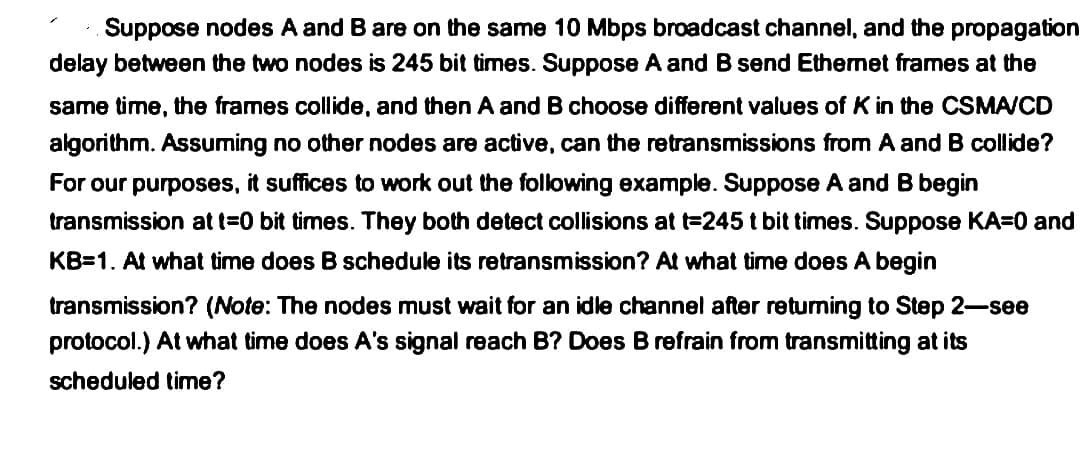Suppose nodes A and B are on the same 10 Mbps broadcast channel, and the propagation delay between the two nodes is 245 bit times. Suppose A and B send Ethernet frames at the same time, the frames collide, and then A and B choose different values of K in the CSMA/CD algorithm. Assuming no other nodes are active, can the retransmissions from A and B collide? For our purposes, it suffices to work out the following example. Suppose A and B begin transmission at t=0 bit times. They both detect collisions at t=245 t bit times. Suppose KA=0 and KB=1. At what time does B schedule its retransmission? At what time does A begin transmission? (Note: The nodes must wait for an idle channel after returning to Step 2-see protocol.) At what time does A's signal reach B? Does B refrain from transmitting at its scheduled time?
Suppose nodes A and B are on the same 10 Mbps broadcast channel, and the propagation delay between the two nodes is 245 bit times. Suppose A and B send Ethernet frames at the same time, the frames collide, and then A and B choose different values of K in the CSMA/CD algorithm. Assuming no other nodes are active, can the retransmissions from A and B collide? For our purposes, it suffices to work out the following example. Suppose A and B begin transmission at t=0 bit times. They both detect collisions at t=245 t bit times. Suppose KA=0 and KB=1. At what time does B schedule its retransmission? At what time does A begin transmission? (Note: The nodes must wait for an idle channel after returning to Step 2-see protocol.) At what time does A's signal reach B? Does B refrain from transmitting at its scheduled time?
Principles of Information Security (MindTap Course List)
6th Edition
ISBN:9781337102063
Author:Michael E. Whitman, Herbert J. Mattord
Publisher:Michael E. Whitman, Herbert J. Mattord
Chapter6: Security Technology: Access Controls, Firewalls, And Vpns
Section: Chapter Questions
Problem 2RQ
Related questions
Question

Transcribed Image Text:Suppose nodes A and B are on the same 10 Mbps broadcast channel, and the propagation
delay between the two nodes is 245 bit times. Suppose A and B send Ethernet frames at the
same time, the frames collide, and then A and B choose different values of K in the CSMA/CD
algorithm. Assuming no other nodes are active, can the retransmissions from A and B collide?
For our purposes, it suffices to work out the following example. Suppose A and B begin
transmission at t=0 bit times. They both detect collisions at t=245 t bit times. Suppose KA=0 and
KB=1. At what time does B schedule its retransmission? At what time does A begin
transmission? (Note: The nodes must wait for an idle channel after returning to Step 2-see
protocol.) At what time does A's signal reach B? Does B refrain from transmitting at its
scheduled time?
Expert Solution
This question has been solved!
Explore an expertly crafted, step-by-step solution for a thorough understanding of key concepts.
This is a popular solution!
Trending now
This is a popular solution!
Step by step
Solved in 6 steps with 23 images

Knowledge Booster
Learn more about
Need a deep-dive on the concept behind this application? Look no further. Learn more about this topic, computer-science and related others by exploring similar questions and additional content below.Recommended textbooks for you

Principles of Information Security (MindTap Cours…
Computer Science
ISBN:
9781337102063
Author:
Michael E. Whitman, Herbert J. Mattord
Publisher:
Cengage Learning

Principles of Information Security (MindTap Cours…
Computer Science
ISBN:
9781337102063
Author:
Michael E. Whitman, Herbert J. Mattord
Publisher:
Cengage Learning